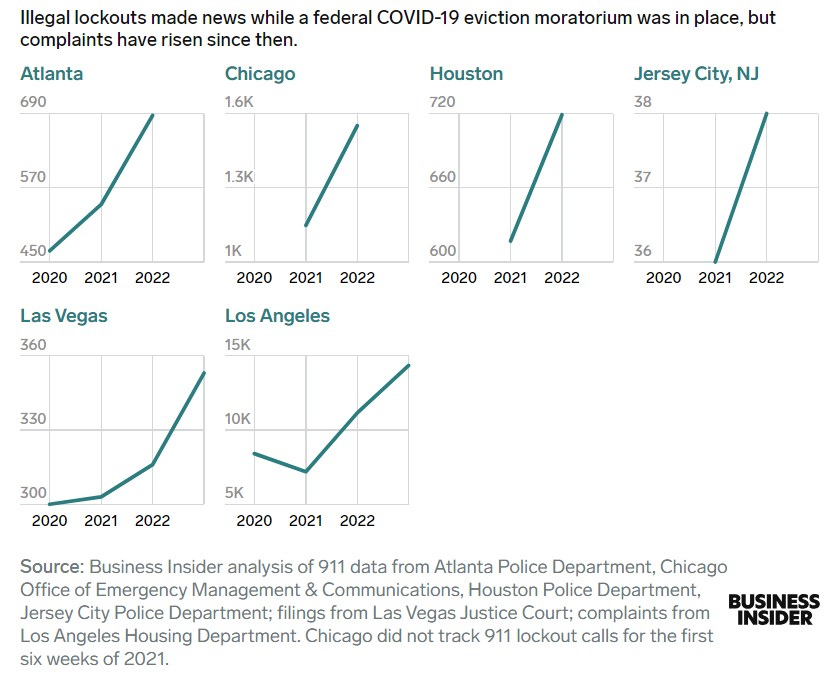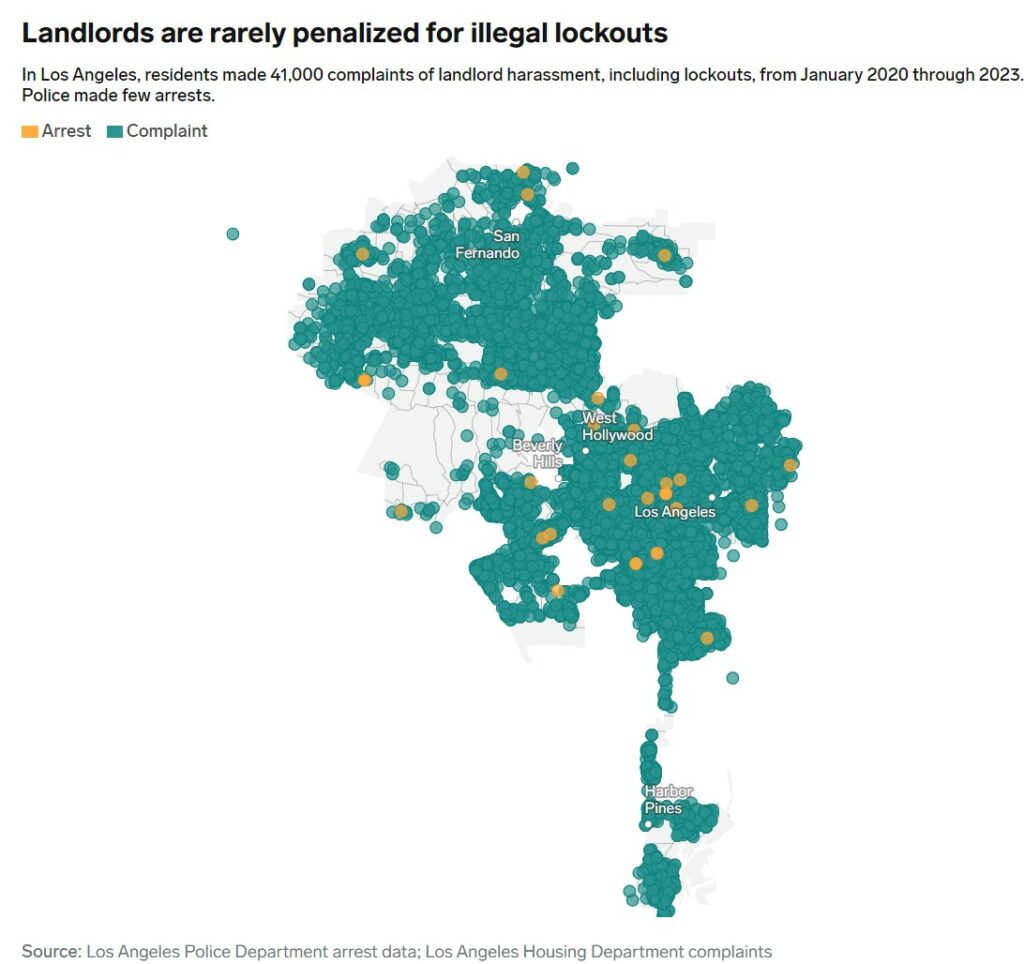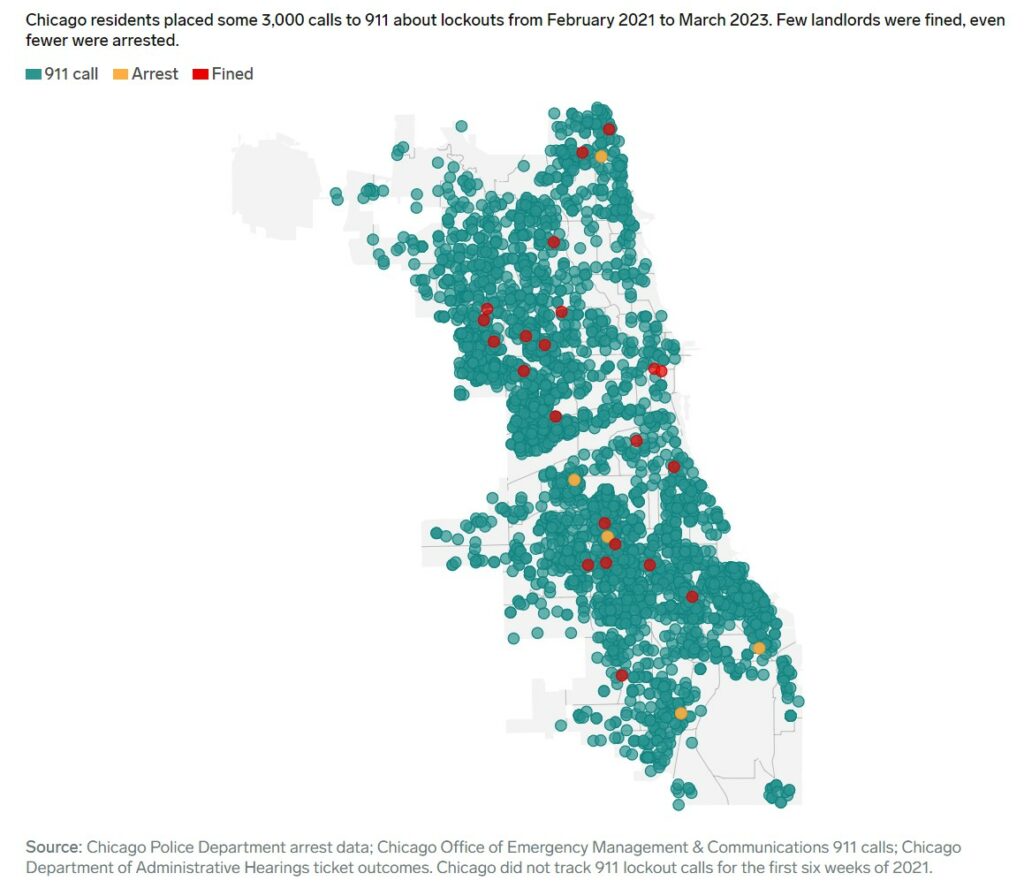Evictions are on the Rise and Police Fail to Enforce
Illegal Evictions Complaints Rise As Police Fail to Enforce – Business Insider
Alfred Perry got word on Labor Day weekend. He’d just thrown one of his signature cookouts in the courtyard of his apartment complex in Las Vegas.
It was the kind of laid-back life he came southwest for. A Chrysler retiree from the Detroit suburbs, Perry enjoyed the warm weather and lights of Vegas as he was driving through over three years ago. He decided to stay. As luck would have it, he said, he had enough left from his pension and Social Security checks when Dan Wright offered him a studio apartment downtown. Perry put down the first month’s rent and a deposit and moved in shortly after.
But when a relative told him to come back to the Midwest to handle a family emergency that September of 2022, Perry didn’t hesitate. He had paid that month’s rent, he said, and set out on the long trek to fetch his 5-year-old son, whose mother was in crisis.
When Perry arrived back home with the boy about a month later, his keys no longer opened the door.
Wright had been having issues with Perry over visitors to his apartment. So Perry was anxious that Wright wanted him out. The night Perry came back in the wee hours, he said, he and his son stayed with a neighbor. The next day, he said, Wright refused to let him back in.
Perry and his son started living out of his Jeep.
Previous convictions for drug possession made finding a new apartment difficult. Months passed with the pair living out of Perry’s car. Someone reported the situation to law enforcement, a spokesperson for the North Las Vegas Police Department said, and officers pulled Perry over to do a welfare check on his son. Officers arrested Perry on charges including child neglect and driving without a license and turned his son over to Child Protective Services.
Perry said he spent a year trying to regain custody.
“I take my share of the blame for having my son out there like that,” Perry said. “But if Dan hadn’t locked me out, I’d still have my son today.”
Perry filed a complaint saying Wright had locked him out illegally. That’s when a landlord turns off utilities, changes locks, or otherwise keeps tenants from their home without first getting a judge’s consent.
Protections against these kinds of extrajudicial evictions date back centuries. Today, lockouts are criminalized in six US states, punishable by imprisonment, and are banned by civil statutes, enforceable by fines and civil suits, in those states and 39 others.
But a Business Insider investigation has found that in cities across the United States, complaints about lockouts are on the rise. Tenants in crisis are mostly stuck calling the police, who rarely take action against property owners who may have broken the law, BI found.
Some police departments even instruct responding officers not to get involved, leaving tenants to face sudden homelessness despite civil and criminal laws intended to protect them from precisely that fate. The absence of a federal law banning lockouts, a patchwork of state laws, the lack of police action, and an uphill battle for tenants in court have together allowed many landlords to lock tenants out with impunity.
Complaints about illegal lockouts are on the rise
The nature of illegal lockouts means they are hard to track directly. To gauge how often they happen, BI reviewed thousands of 911 calls, housing complaints, and court records and found evidence suggesting that illegal lockouts have increased in recent years.
Their rise comes as half of all US renters or more than 22 million households are facing financial stress over housing costs. Renters are spending more than 30% of their income on rent and utilities. A burden that makes it easy to fall behind on rent, and catastrophic to be abruptly thrown out into a tight rental market.
The rise in lockout complaints also came as more investors sought to cash in on residential property management and ownership during the pandemic. Some of them were inexperienced first-time landlords who may have been unfamiliar with landlord-tenant laws. Others were corporations and private-equity firms.
Landlords have a variety of motivations for wanting a tenant out, from unpaid rent to simply not getting along. Even if their reasons are legitimate, landlords in most jurisdictions are required to go to court to seek an eviction and provide a tenant with notice of the eviction filing. Bypassing that system is illegal in most states, whether the landlord’s grievance is justified or not.
The lack of due process in a lockout means someone like Perry never gets to show a judge his rent was paid up or prove that he’d followed the rules of his lease. And the lack of notice robs tenants of a window in which to line up alternative housing.
In Perry’s case, Wright claimed that Perry left voluntarily, with his possessions. “I know the laws — I don’t mess with them,” Wright said.
But Wright has a history of wrongful evictions, according to documents from the Las Vegas Justice Court: In 2022, his LLC was ordered to pay back nearly $900 for turning off the electricity on another tenant in Perry’s building, and in 2020, he was ordered to restore access to a renter at another property after a judge found he’d illegally removed her.
Of the 2022 case, Wright said one of his employees got “overzealous”; of the other case, he said he’d tried to let the tenant back in.
“Just because tenants file something, it doesn’t mean something is true,” he said.
A judge never decided who was right in Perry’s case. His complaint was tossed on a technicality. He’d missed the window to file.
Tenants and their advocates say lockouts are extraordinarily disruptive. People often miss days of work or lose their job as they prioritize finding somewhere to stay. Children fall behind academically or have to leave school altogether. Losing everything means starting from scratch, straining savings to pay for motels or to replace furniture, clothing, or medications.
“It is such a traumatic thing for a family to be locked out without warning,” Charlie Bliss, the director of advocacy at Atlanta Legal Aid, said. “It’s the beginning of a real bunch of trouble.”
‘I’m sick of calling the cops’
Lockouts largely happen out of public view.
But research shows they may be widespread. In 2015 a Princeton sociology professor, Matthew Desmond, surveyed Milwaukee tenants and found a ratio of two informal forced removals to every one where landlords went through a formal court process and got a judge’s eviction order.
To piece together how often lockouts occur, BI sought records left in the wake of these illegal eviction attempts from police departments and housing agencies in eight large cities that have a high proportion of renters or tight housing markets, including Los Angeles, Chicago, Atlanta, and Las Vegas. We obtained 911 call logs and audio, police reports, bodycam footage, arrest data, and housing complaints.
Lockouts briefly gained visibility during the coronavirus pandemic, as landlords sought to bypass a federal moratorium on evictions. But the expiration of the moratorium has not resulted in the abandonment of these illegal tactics.
Our investigation unearthed hundreds of cases in which data shows that the police did little to nothing when answering emergency calls for help with an illegal eviction.
The landlords rarely faced consequences.
In South Chicago, a landlord was ticketed for changing the locks on a tenant in January 2023; the ticket was tossed and he was let go with a verbal warning. On Christmas Day 2022 in Phoenix, a woman who called 911 said her landlord was hooking up her trailer to his red Chevy truck in an effort to evict her. When the police called her back two hours later, they couldn’t reach her. The incident was closed as “no action required.”
Landlords are rarely penalized for illegal lockouts
911 records from the winter of 2022-2023 indicate that a pregnant woman in Jersey City’s McGinley Square neighborhood was locked out of her apartment for five days. She said she was stuck doubled up with her grandmother in a local YMCA.
“I’m sick of calling the cops and nobody doing anything,” she tells a 911 dispatcher, frustrated after describing her situation multiple times to different police officers and call takers. “I’m freezing, I haven’t took my prenatals in days, changed my clothes in days.”
The first time she called 911 about being locked out, her landlord said it was because he did not want her dog in the house. He sat in the entrance to the apartment, undeterred by police officers telling him he could be arrested.
Lockouts are a crime in New Jersey. But the officers didn’t arrest him or give him a citation, telling him to let the woman inside and take her to court. The landlord locked her out again two months later for four days, she reported to 911. A different pair of officers responded; bodycam footage shows them trying to reach the landlord by phone after the tenant says he’s blocked her number. Then, they tell her to get a locksmith. She called 911 again not long after, saying the locksmith had asked for cash but her cash was locked inside her apartment. It was a Catch-22.
Bodycam footage shows an officer again trying to call the landlord, but the call goes straight to voicemail. One of the responding officers calls a sergeant over, who says there’s nothing else they can do. Jersey City officials did not respond to requests for comment.
If she breaks back into her own home, the sergeant says, she’ll shoulder the risk.
“We’re advising against it, but you’re a grown woman,” one officer tells her. “What you do is what you do — it’s on you.” Meanwhile, with her uniform locked inside, the Jersey City woman says she missed days of work.




comments seem to have been sucked into the shooting maelstrom
but there is this…when you look at the rise of Trump ask what you or Democrats have done about this.
but what can I do? answer is nothing. destroying neighborhoods and families was the first consequence of industrialization. magahats are more likely to notice this than urban liberals. but they blame…with some help..the libs for it. they are angry. we are sympathetic for ten seconds while we are reading about it.